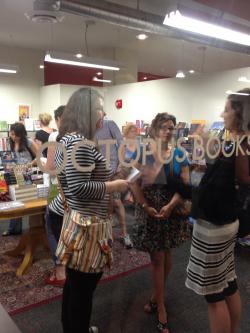By rob mclennan
After more than four decades, independent bookseller Octopus Books has established a secondary location in Ottawa?s downtown core. Much like the expansion of Collected Works Bookstore and Coffeebar, Octopus Books works against the trend of bookstore closings, opening a new location upstairs at 251 Bank Street, not far from their long-retired original location slightly west, on Somerset Street West. This new location will be a shared space, part of the Under One Roof initiative, a partnership with community groups and ?social justice advocates,? expanding the services of their home location, slightly south in Ottawa?s oldest neighbourhood, the Glebe, at 116 Third Avenue.
Originally begun in 1969, according to the Octopus Books website, it ?began as a socialist newspaper but soon evolved into a small bookstore.? Long run by a socialist, feminist collective, the store was purchased by some of its members in 1996, including Lisa Greaves, who was once called ?Octopus Books owner-of-amazingness? by Toronto writer (and former Octopus Books staffer) Jessica Westhead (other authors who have worked at the store over the years have included Cameron Anstee and myself). Under Greaves, the store celebrated 40 years on October 30, 2009, with an event at The Carleton Tavern, with a reading by Whiteford, and performances by Brothers Creegan and Bidiniband. At the time, Hugh Armstrong described the store in rabble.ca as ?a vital part of various movements in the region.? He wrote:
Forty years ago, the book ordering service provided by Octopus, a New Left tabloid paper of the day in the Ottawa area, became too much for Steve Harris, the paper?s publisher, chief writer, distributor, bottle washer, whatever.
A small group of us, primarily graduate students, concocted — with Steve?s help — the audacious plan to spin Octopus Books off from the paper. (Little did we know that we were pioneering in Ottawa the entrepreneurial model soon to be followed by Northern Telecom with SHL Systemhouse, Corel and dozen of others that have come and gone.) We badgered friends and professors for enough start-up cash to order a few books, rent some dingy space and build a few bookshelves.
Amazingly, Octopus Books still exists. (The high-tech firms mentioned above aren?t doing as well.)
Part of the mandate of the store has long been ?to provide a forum for radical and revolutionary voices, local authors, small presses, and writers from a variety of countries and cultures,? and the store stocks a variety of titles on international politics and socialism, environmental politics, feminism, political action, race, indigenous studies, class, unusual histories, philosophy, Canadian and international literature and more, as well as a range of ?politically aware gift items.? In an interview last year with Westhead on 49thshelf.com, Greaves said of the store, ?Every once in a while, I realize I live and work in a bubble where for the most part, I am not forced to compromise my values. I try to stay true to the nonprofit and collective principles that started the store. That means I don?t have to sell books I don?t believe in, I don?t have to deal with companies whose policies offend me, and I get to close on Buy Nothing Day. It is incredibly liberating and unusual to not always have to make decisions based on the bottom line. I get to organize events I believe in, stock books I think are important, raise funds for causes I want to support. I also work with wonderful people — the other staff in the store, book reps, other booksellers are really great. Oh, and the books, they?re pretty good too!?

Greaves was good enough to take some time out of her busy day to answer some questions on the history of the store, and their new, secondary location.
Q: What does Octopus Books hope to achieve through a second location? What prompted the shift?
A: About two years ago, I met with Diane Touchette who is the powerhouse behind the conception and inception of Under One Roof. At the time of our meeting, it was really just a ?I have this idea, do you think you would be interested?? kind of thing — I think it is a great idea, and I knew about CSI (Centre for Social Innovation) in Toronto, so I knew that the concept could work.
I said I would be interested without knowing specific things like when and where. I think it is much easier to go into something with vague details, much less room for pointing out specific problems. So much of what Octopus has always been is a reflection of our community. I mean community in a broad sense — our physical community, as well as those with whom we are politically aligned. In a time when we (those of us who care about things like the environment, the arts, social justice etc...) are under assault from a rabid Conservative government, it makes more sense than ever to be close physically as well as philosophically with our allies. It?s also a tough time to be an independent bookseller, so it seems logical to try to branch out in a new direction, since the old model definitely needs a tune up!
Q: How has Octopus Books evolved since its original inception? How difficult or easy is it to maintain the core values of the store while running it as a business?
A: The inclination for me is to say that it hasn't changed much. We try out new sections as issues change, but as much as possible, we make decisions collectively, and although there are fewer of us than the Collective?s heydays, I feel like things are somewhat the same. I think someone who was around in the early days would be in a much better position to see the changes. I have been involved with Octopus since 1994 (when we met, flutter flutter) and it?s all a bit blurry! In fact, maintaining the core values are still a guiding principle. Many of the decisions we make would not be made by a business that had profit as it?s main motive. We regularly stock books that we won?t make much money on; host events we will lose money on; keep staff on when we can?t afford to — all as part of the philosophy (as I interpret it) and legacy that we inherited.
Q: When you first bought the store, it went from being a collective to a business. What were the challenges in the shift? Were there any drawbacks? And not long after, Octopus Books moved from its space on Bank Street to its current home on Third Avenue, merging with the Architecture Bookstore.
A: The biggest challenge was that we inherited a debt of about $140,000.00, bad relationships with suppliers and a much smaller space. We shared space with the architecture bookstore, and they paid us to work in the store and do a bit of the administrative work for them. They decided to close in 1997 (I think), and then we had a bit more space, but it is still tiny.
It was very difficult to go from working with lots of people making decisions collectively to it just being two, and then just me. Because there was so much debt, there wasn't a possibility of hiring staff, so the two of us worked a lot. When Bob left in 1998, things were very tough — at one point, I rented out my house and lived at the store (which I am pretty sure is a no-no) — when I realized I hadn?t walked outside for about 72 hours at one point, I realized it was time for a change and I brought on more staff. That was a great thing, in part because it meant I didn?t have to work so much, but more importantly because it was so great to share ideas and vision with people. I would never go back to doing this on my own. It is too difficult a lifestyle, and ultimately it doesn?t represent the store?s core values.
Q: What do you think you?ve learned over the years that you might not have been expecting?
A: It?s not the most insightful or inspiring thing — but I am regularly amazed at the range of topics people are so involved with — enough to research and write a book. From the most basic to the most complex, it really adds to the lens through which I see the world.
|
|
Born in Ottawa, Canada?s glorious capital city, rob mclennan currently lives in Ottawa. The author of more than twenty trade books of poetry, fiction and non-fiction, he won the John Newlove Poetry Award in 2011, and his most recent titles are the poetry collections Songs for little sleep, (Obvious Epiphanies, 2012), grief notes: (BlazeVOX [books], 2012), A (short) history of l. (BuschekBooks, 2011), Glengarry (Talonbooks, 2011) and kate street (Moira, 2011), and a second novel, missing persons (2009). An editor and publisher, he runs above/ground press, Chaudiere Books (with Jennifer Mulligan), The Garneau Review (ottawater.com/garneaureview), seventeen seconds: a journal of poetry and poetics (ottawater.com/seventeenseconds) and the Ottawa poetry pdf annual ottawater (ottawater.com). He spent the 2007-8 academic year in Edmonton as writer-in-residence at the University of Alberta, and regularly posts reviews, essays, interviews and other notices at robmclennan.blogspot.com.
Photo of rob mclennan by Stephen Brockwell
|
Photos courtesy of Octopus Books.


Post new comment